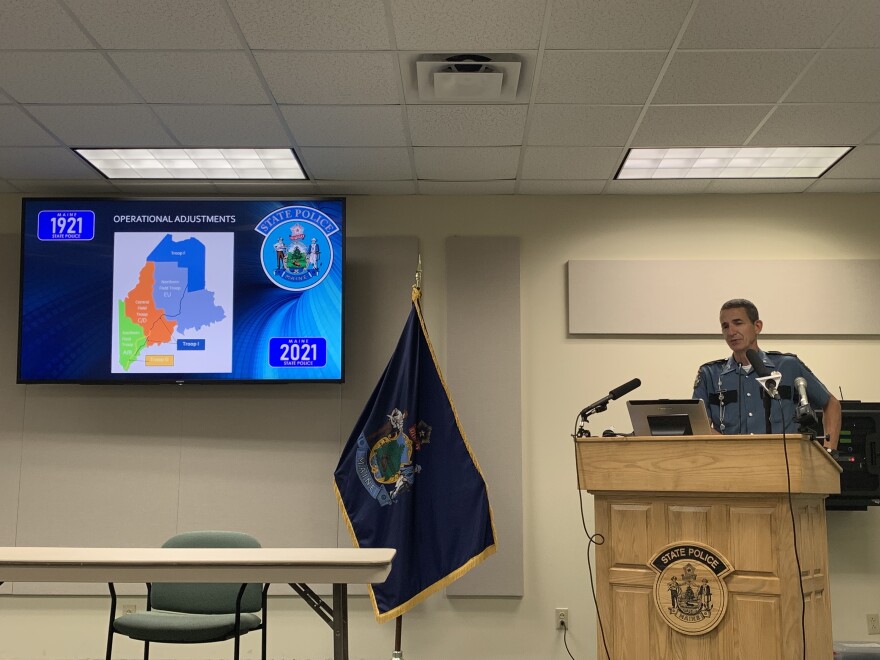Word that change was on the horizon emerged nearly a month ago, but details were scarce.
In a press briefing Tuesday, state police described their plans to roll out a series of organizational changes starting early next year, along with a new body camera program and team of behavioral health specialists.
Col. John Cote said the changes are necessary after years of budget and staffing challenges. The department has 34 trooper vacancies today, he said, and more are expected to retire.
"As we take this snapshot right now and look forward for the next several years, we know we are not going to get this large influx of frontline personnel," Cote said. "So it really drove us to realize we needed to come up with a non-traditional solution."
At the center of the reorganization is a plan to consolidate the eight Maine State Police troops down to six.
Today there are seven troops that provide regional coverage throughout the state, plus an eighth that services the Maine turnpike.
In the future there will be four regional troops: a southern, central and northern unit, plus a troop in Aroostook County. A fifth unit will continue service on the Maine turnpike. And state police will add a new sixth unit to patrol I-295 and I-95 from Augusta to the Aroostook County border.
The public shouldn't notice many changes, Cote said.
"If you have a trooper that lives two houses down and he patrols your area, that trooper is still going to live there and patrol your area," he said. "This does not involve us pulling any resources out of any areas. What we do plan on is just better utilizing our limited number of people so they're in the areas where they're needed most."
Cote said the consolidation will allow for other changes, such as adding an overnight shift on certain days of the week. That will limit the number of officers who remain on call when they go home.
Lieutenants from the newly dissolved troops will oversee special projects and specialty teams. And state police will reassign others to the bomb and dive teams, computer crime and major crime units. The three major crime units will each receive a new detective.
And in response to national discussions about policing and mental health, Cote said the department will add five new behavioral health specialists who will assist people in crisis who might be experiencing homelessness or substance-use disorder.
"Many times officers respond to these people in crisis, but move and get called to another call and don't get a chance to come alongside these people in need and make the connection with the local area resources and service providers that could maybe intervene and make a difference for that person," Cote said.
State police will also introduce body cameras sometime early next year. Most trooper vehicles have cameras on their dashboards today, and Cote said the legislature authorized funding for a new body camera program in Maine.
"Our goal with this first evolution of the body camera program is to have every uniformed trooper, pretty much every sworn member on the frontlines, is going to have an in-car camera and a body camera," he said.
It's still unclear exactly how many troopers will be impacted by the consolidations, and Cote said exact roster moves are still in the works.
Mary-Anne LaMarre, executive director of the Maine Sheriffs Association, said county sheriffs were briefed about the reorganization, and police assured them restructuring wouldn't impact existing agreements.
Many counties rely on state police to patrol rural areas that their own staff simply can't reach. When those agreements change, sheriffs departments and county officials are often left scrambling in search of more personnel and funding to reach those rural areas.
The first of the organizational changes will go into effect in January and will continue through next summer.




